
Section Branding
Header Content
Georgia Today: GA elections are expensive, speeding to blame in death of UGA player, adios Josef
Primary Content
On the Wednesday Jan. 18 edition of Georgia Today: The Secretary of State says Georgia needs more money to run its high-profile elections, speeding is to blame for the death of a UGA player, and adiós Josef

Peter Biello: Welcome to the new Georgia Today podcast from GPB News. Today is Wednesday, Jan. 18. I'm Peter Biello. On today's episode: The secretary of state says Georgia needs more money to run its high-profile elections. Police say speeding contributed to the car crash that killed a Georgia football player and recruiting analyst last weekend. And Atlanta United's biggest star is heading south. These stories and more are coming up on this edition of Georgia Today.
Story 1
Peter Biello: Athens-Clarke County police say excessive speed was the primary cause of the car crash that killed Georgia football player Devin Willock and recruiting analyst Chandler LeCroy this weekend. Bulldogs player Warren McLendon and staffer Victoria Bowles were also in the car. McClendon sustained minor injuries and Bowles was hospitalized with serious injuries. Funeral services for Chandler LeCroy are scheduled for this afternoon (Wednesday) at First Baptist Church of Toccoa. The UGA Football Team and Staff will serve as honorary pallbearers.

Story 2
Peter Biello: Secretary of State Brad Raffensperger told lawmakers today that Georgia's high-profile elections means his office needs more money in the budget. At the joint appropriations hearing, he said one example is upgrading battery backups for the state's voting machines.
Brad Raffensperger: The current UPS is a lead-based battery. It's robust. It also weighs 80 pounds. Our average poll worker has an age of over 65 years old. And it's a burden.
Peter Biello: Raffensperger also asked for money to hire more elections investigators and fund data plans for the tablets used to check in voters on Election Day.
Story 3
Peter Biello: One of the three men who killed Amaud Arbery has been transferred to a state medical prison in Augusta. Gregory McMichael and two others were convicted in the racially motivated fatal shooting nearly three years ago. He has been incarcerated at a state prison near Jackson. The Georgia Department of Corrections now lists his location as the Augusta State Medical Prison. It's unclear why he was transferred, but in a court filing before his sentencing, his attorney said he suffered from various medical conditions.

Story 4
Peter Biello: Atlanta United is parting ways with its star striker, Josef Martinez. The team said this morning that Martinez has been released from the club and is transferring to Inter Miami. The move is expected given his struggles last season under coach Gonzalo Pineda. Sportswriter Sydney Hunter of Dirty South Soccer says it's still a blow to Atlanta sports.
Sydney Hunter: He's meant a lot to Atlanta United, and not just Atlanta United, to Atlanta sport as a whole. A lot of people that really weren't into soccer maybe were drawn in due to Josef Martinez's personality.
Peter Biello: Atlanta's passionate soccer fan base adopted as one of their own the Venezuelan who led United to three stellar seasons, including a Major League Soccer championship in 2018. In a statement, the team's technical director, Carlos Bocanegra, said, "He will always be part of Atlanta United, and we wish him the best of luck in his future endeavors."
Story 5
Peter Biello: Savannah-area community leaders are preparing to welcome new neighbors from South Korea. With construction underway at a massive Hyundai Electric vehicle manufacturing plant in nearby Bryan County, a series of seminars this week is aimed at learning more about South Korean culture. Savannah World Trade Center President Trip Tollison says the project's long-term success requires cultural awareness and sensitivity.
Trip Tollison: And what we're trying to do is present our community in the most positive light that we can for our friends coming out of South Korea. And it's not just for their workers: It's for the families, too — so all the spouses that are here, their children.
Peter Biello: The Hyundai plant scheduled to open in two years, promises 8,000 jobs, the vast majority of which will be filled locally. The seminars will cover language and cultural differences to help locals better navigate a region becoming more international.
Story 6
Peter Biello: Georgia got its newest rage room last year. Also called smash rooms or anger rooms, these businesses offer safe spaces to physically vent, but do they actually improve mental health? GPB's Orlando Montoya reports.
John Sukowske: I told you, as soon as I hit it, it's gone. It was gone either way. Yeah, I'm gonna get out of your way.
Orlando Montoya: It's 9:00 on a Friday evening, and Ansley and John Sikorski have come to a business called Outrage in Kennesaw, north of Atlanta. Inside a room with cinder block walls and a heavy metal soundtrack, they wield crowbars, bats and an 8-pound sledgehammer to break plates, glassware and junk electronics. They wear safety goggles and gloves, and after a while, they start panting. It's a bit of a workout to smash so much stuff. Ansley says she doesn't have rage so much as the normal stress of a stay at home mom.
Ansley Sukowske: I think it'd be — definitely be a fun mom's night out. I can see moms over with that break in plates not having to worry about them being broken.
Orlando Montoya: Other customers come in with more specific emotions to deal with. Isabella and Gary Storey say they're letting out a bit of pandemic-era frustration. Gary bought the session for his wife as an anniversary gift.
Gary Storey: She works at a pharmacy, so she deals with the public every single day and has for the past three years, going through COVID and everything's on front line. So having to release a little stress is a good thing.
Isabella Storey: You just think about things that upsets you that you've got to like suck down in rhe regular world and you just let it out.
Orlando Montoya: Rage room owner Kevin Torsel says customers open up to him about problems at work, difficult family members and other personal traumas.
Kevin Torsel: Like deaths in the family. And a lot of times what they do is they come in with like their grandma's old china and they get to break their grandma's old china. So on the china, they'll write down, "Oh, I miss my grandma because of this," or "I love my grandma. Rest in peace, Grandma." And then he gets to break those stuff. And it's just kind of a way to say, "Oh, I'm letting that go."
Orlando Montoya: Torsel sees his rage room as both a business and a mission. He credits smashing plates with helping him deal with anger management issues stemming from his relationship to his father.
Kevin Torsel: Writing on a plate, breaking it — it was able to help me because I took a picture of that plate because I knew I was going to break it. And I used to show my mom. So my mom used to know how I was feeling.
Orlando Montoya: There's little research on the therapeutic benefits of raids, rooms, ax throwing, or other such businesses. Licensed clinical therapist Reuben Darku runs an anger management clinic north of Atlanta. He says rage rooms may work as a fun night out, but aren't good as a long-term solution to serious problems.
Rueben Darku: If it is for fun, absolutely. It's okay. Go have fun there. It has to be combined — if you have anger issues, it has to be combined with, you know, seeing a therapist to address the root cause of those behaviors.
Orlando Montoya: Georgia's newest rage room opened in Savannah last year. There's another one in Carrollton. In recent years, rage rooms have been a growing national trend. In Outrage, customers pay $90 for 20-minute sessions. Outraged customers smashed about two tons of material every week — stuff Torsel gets on the cheap from junk haulers.
Kevin Torsel: For example, when you bust a microwave open or a old dryer, there's motors and there's copper that they can't really access or they don't have time to get to. So we actually put everything — separate it for them — so when they come get them, all they have to do is take out the scrap with them and then it's a win-win situation.
Orlando Montoya: It's like they're going to break it anyway, so might as well you break it.
Kevin Torsel: Correct.
Orlando Montoya: He says he follows federal safety rules about what can and cannot be smashed up. Things like older, non flat screen TVs and the toxic toner in printers aren't allowed. Torsel says his two year old business is so good that he plans to leave his suburban location and expand it in higher rent. Atlanta. For GPB News, I'm Orlando Montoya.

Story 7
Peter Biello: Getting solar panels installed on your home can decrease your carbon footprint, but it can be expensive. One way to lower that cost is by selling some of the excess power generated by those panels back to the grid. That's called net metering. But there are limits on how much you can be paid for that electricity. And recently, clean energy advocates were disappointed by the Public Service Commission's regulatory decisions for net metering for the coming year. Joining me now is one of those advocates. Dr. Marilyn A. Brown is a professor of sustainable systems in the School of Public Policy at Georgia Tech. So you were advocating recently for Georgia Power to pay people who generate electricity at home the same price per kilowatt as Georgia Power charges its customers. But that did not happen. Can you tell us what happened instead?
Dr. Marilyn Brown: What happened is that the commission elected to settle on a value for the buyback rate of 6.68 cents per kilowatt hour, which is halfway between the old buyback rate, 2.3 cents per kilowatt hour, and the current retail rate of perhaps 13 cents per kilowatt hour. So they settled on a kind of an in-between middle of the road approach because I think that they were not certain and had to compromise.
Peter Biello: I say so a little better than what it was previously, but not as good as you'd like it to be. And you're saying it's a little disappointing, in part because if people who put solar panels in their home get more money for the excess power that they generate, more than Georgia Power is currently planning to pay, more people might decide to install solar panels, which would reduce the state's overall greenhouse gas emissions.
Dr. Marilyn Brown: That's correct. So the cost of solar systems has been coming down exponentially. Actually, it's been a great success story, but it's still costly. You have to pay some tens of thousands — or $10,000, let's say maybe — and you have to pay it back from savings from selling power to Georgia Power is cut in half, so it's going to take you much, much longer to pay off the upfront capital cost.
Peter Biello: Is the Public Service Commission's decision on this indicative of the state's push overall for a focus on larger solar rather than individual homeowners putting it somewhere in their property?
Dr. Marilyn Brown: I think so, because the rate of return on investments by the Georgia Power Company or other utilities get a pretty good return when it's a utility-scale solar farm. But when the individual homeowner is using their capital and they're getting the payback, the power company doesn't get the same rate of return. So there's a differential. They're not as motivated to help us as homeowners.
Peter Biello: While we're talking about money. Let's talk about other incentives. The Inflation Reduction Act has some subsidies for solar installations, some tax credits. How strong are those when it comes to incentivizing homeowners to install solar panels?
Dr. Marilyn Brown: You know, there is a 30% investment tax credit, but that investment tax credit has been around since the year 2005, and it has not driven solar into the marketplace on rooftops in Georgia. It's positive. It's important. I'm glad we have it. It might make a difference for middle and upper middle homeowners, but it doesn't enable those who are resource-constrained to justify the purchase of solar on their homes.
Peter Biello: These rates won't be revisited again for another three years. And you've said that, you know, there's there's missing data here that would make the case stronger, data that would show to the regulators that that people who have solar panels actually cost utilities less to serve. In between now and the next time these rates are evaluated, will advocates, scientists, people who study solar be collecting data on how much it costs for people with solar and Georgia to be served by entities like Georgia Power?
Dr. Marilyn Brown: I don't think that the public advocates will be doing that. I think that Georgia Power will be encouraged to do that. They're really in the best position with data on their own customers. That's what you need. We can't do it from afar as analysts sitting in our offices. We need the data. So I think they'll be encouraged to do that. I'm optimistic. We pointed out this gap, and I believe that it'll — it'll be filled. I'm hopeful.
Peter Biello: Well, Dr. Marilyn A. Brown is a professor of sustainable systems in the School of Public Policy at Georgia Tech. Thank you so much for speaking with me.
Dr. Marilyn Brown: Thank you.
Story 8
Peter Biello: The NFL has directed the Kansas City Chiefs and Buffalo Bills to begin selling tickets for a possible AFC championship game in Atlanta. The game will be played at Mercedes-Benz Stadium if both teams win in the divisional round this weekend. If either loses, the game would be hosted by the higher-seeded team. The top-seeded chiefs are hosting Jacksonville, while the number two seed bills are facing Cincinnati. The NFL mandated a neutral site after the Jan. 2 game between the Bengals and the Bills was canceled after Buffalo safety Damar Hamlin suffered cardiac arrest and had to be resuscitated on the field.
And that is it for today's edition of Georgia Today. Listening to this podcast once is great. Listening every weekday afternoon is even better. So go ahead and hit subscribe. That way. We will pop up in your podcast feed tomorrow.
Got feedback? If so, we'd love to hear it. Send us an email. The address is GeorgiaToday@GPB.org. I'm Peter Biello. Thank you so much for listening. We'll see you tomorrow.



